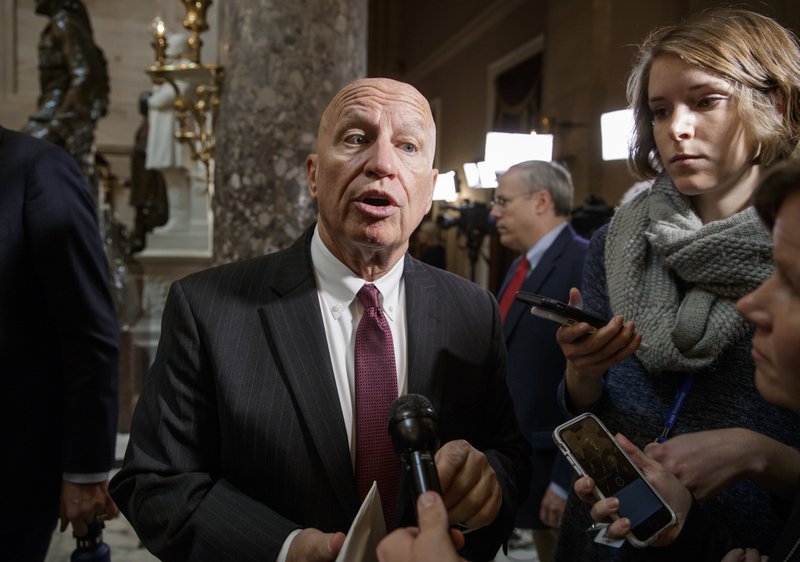WASHINGTON -- Bowing to concerns from Republican House members in high-tax states, the chamber's chief tax writer said he'll preserve a federal income-tax break for property taxes.
"At the urging of lawmakers, we are restoring an itemized property tax deduction to help taxpayers with local tax burdens," House Ways and Means Chairman Kevin Brady said in a statement Saturday afternoon.
The announcement came on the same day that the National Association of Home Builders pulled its support for the tax-overhaul bill over the expected treatment of mortgage interest and state property taxes.
Brady's statement is aimed at resolving an impasse between House leaders and roughly two dozen Republican lawmakers from states including New York and New Jersey over an attempt to repeal federal tax breaks for state and local taxes. The issue threatened the prospects for a planned tax-overhaul bill in the House. Brady plans to introduce actual bill text this week.
[PRESIDENT TRUMP: Timeline, appointments, executive orders + guide to actions in first 200 days]
Congressional leaders and President Donald Trump have suggested ending the existing state and local tax deductions as a way to generate as much as $1.3 trillion over 10 years -- revenue that would help offset the deep tax-rate cuts they want for businesses and individuals. Restoring the property-tax deduction would trim that revenue projection by about a third -- or $430 billion -- said a conservative tax lobbyist who asked not to be named because discussions about the bill were private.
It would appear that deductions for state and local income taxes and sales taxes would still be repealed under the planned House bill.
In an earlier blow, Jerry Howard, chief executive officer of the National Association of Home Builders, said the group will oppose the legislation because House Speaker Paul Ryan told him it won't include a tax credit for mortgage interest and state property taxes. The association, which claims 140,000 members will "do everything that we can now to make sure that it doesn't pass," Howard said.
Brady's office released a statement Saturday afternoon that praised the homebuilders group and called on members of Congress to study the tax-credit proposal closely "to determine if they want it included before tax reform heads to the president's desk."
The Saturday flare-ups signal the difficult path ahead for the tax overhaul that Congress and Trump have pledged to deliver by year's end.
Trump and Republican leaders are promoting their tax-cutting plan as needed relief for the American middle class and a catalyst for job creation.
Democrats say they're the ones looking out for the middle class, by fighting against proposed tax cuts that would benefit big companies and the wealthy but hurt the average American.
The Tax Policy Center sets its "middle quintile" -- third slice of five -- of household income, including tax-exempt employee benefits like health insurance, at $48,300 to $85,600 a year. But be careful about calling that middle class, it says -- there's no formal definition.
At the high end, Hillary Clinton and President Barack Obama, as candidates, defined middle class as earning up to $250,000 a year. That raised eyebrows because it's in about the top 5 percent of incomes, and the two Democrats had pledged not to raise taxes on the middle class.
The median, or midpoint, U.S. household income was $57,617 last year, according to the Census Bureau.
To fill middle-class stockpots, Trump is promising that the tax cuts would bring a $4,000 or $5,000 pay raise annually for the average family. Skeptical tax experts and Democrats say the claim is based on fuzzy math.
The nearly $6 trillion tax plan calls for cutting the corporate tax rate from 36 percent to 20 percent, reduced taxes for most individuals, and doubling the standard deduction used by most average Americans to $12,000 for individuals and $24,000 for families. The number of tax brackets would shrink from seven to three or four, with respective tax rates of 12 percent, 25 percent, 35 percent and to be determined. Inheritance taxes on multimillion-dollar estates would be repealed.
The middle-class family could take advantage of a heftier child tax credit and the extra money that could come from the bigger standard deduction.
But there are too many holes in the spare nine-page plan, like the income levels tied to each tax bracket and what might happen to other deductions used by middle-class people, to know how it actually would affect individual taxpayers and families.
Brady, a chief architect of the plan, was pressed by reporters last week: Will it truly help the middle class? Can the Republicans guarantee that everyone will get a break, that no ordinary person will end up paying more?
"The elevator goes down at every [income] level. ... I can guarantee that every American will be better off," said Brady, R-Texas. He acknowledged, though, "It could be that a singular exception exists."
A Section on 10/29/2017

